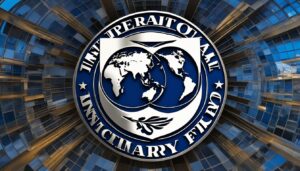The International Monetary Fund (IMF) is a key player in managing global financial crises and has a significant impact on the global economy. As an international organization, the IMF provides financial assistance, policy advice, and technical expertise to countries facing economic challenges during times of crisis.
During a financial crisis, the main goal of the IMF is to stabilize economies, restore investor confidence, and promote sustainable growth. With its vast resources and international reach, the IMF is able to coordinate efforts and provide support to countries in need, helping them navigate through turbulent economic times.
Key Takeaways:
- The International Monetary Fund plays a crucial role in managing global financial crises.
- It provides financial assistance, policy advice, and technical expertise to countries facing economic challenges.
- The IMF’s goal is to stabilize economies, restore investor confidence, and promote sustainable growth during a financial crisis.
- With its vast resources and international reach, the IMF can coordinate efforts and provide support to countries in need.
- The IMF’s actions have a significant impact on the global economy as a whole.
Bangladesh’s Foreign Exchange Reserves and Current Account Balance
Bangladesh has faced challenges in maintaining its foreign exchange reserves and current account balance. The country has experienced a slow but steady increase in foreign exchange reserves, primarily due to controlled imports. However, businesses in Bangladesh continue to grapple with a severe dollar crisis, causing significant implications for the economy.
“Despite the challenges, Bangladesh’s central bank has implemented measures to address the situation and stabilize the current account balance,” says Mohammad Rahman, an economist specializing in international trade.
To boost the current account balance, the central bank has taken steps such as appreciating the taka, the national currency of Bangladesh, and encouraging remittances from overseas Bangladeshis. These measures have helped maintain a surplus in the current account balance.
However, the negative financial account and outflow for private sector loan payments have put pressure on the country’s foreign exchange reserves. In order to meet import payments, the central bank has been forced to sell dollars from its reserves.
The Impact of the Dollar Crisis on Businesses
The dollar crisis has significantly affected businesses in Bangladesh, particularly those involved in importing goods and services from abroad. The scarcity of dollars has made it challenging for these businesses to make timely payments to their international suppliers.
“The ongoing dollar crisis has hindered the import process, causing delays and disruptions in supply chains,” explains Ayesha Rahman, a business owner in the textile industry.
This has led to concerns about the sustainability of businesses and their ability to meet customer demands. The shortage of dollars has also created volatility in the exchange rate, making it difficult for businesses to plan and forecast their financial operations.
Efforts to Mitigate the Crisis
To address the dollar crisis and maintain foreign exchange reserves, the central bank of Bangladesh has implemented various measures:
- Appreciating the taka to increase its value against the dollar
- Strengthening remittance incentives to boost inflows
- Encouraging export-oriented industries to increase foreign currency earnings
- Establishing swap agreements with other countries to secure additional foreign exchange
“These measures aim to ensure a stable foreign exchange market, support businesses, and maintain a healthy current account balance,” adds Mohammad Rahman.
However, the overall impact of these efforts remains to be seen, as businesses continue to face challenges in accessing the necessary dollars to sustain their operations.
| Year | Foreign Exchange Reserves (in billions of USD) | Current Account Balance (in billions of USD) |
|---|---|---|
| 2018 | 32.5 | 4.8 |
| 2019 | 35 | 5.2 |
| 2020 | 39.2 | 6.1 |
| 2021 | 37.8 | 5.7 |
The table above highlights the foreign exchange reserves and current account balance of Bangladesh in recent years. While there has been some improvement, the challenges persist, underscoring the need for continued efforts to stabilize the economy and ensure sustainable growth.
Impact on Business Activities and Expansion in Bangladesh
The challenges faced by Bangladesh in maintaining its foreign exchange reserves and current account balance have had a significant impact on business activities and expansion. The slowdown in capital machinery and industrial raw materials imports indicates a stagnancy in business expansion, hindering growth opportunities for both domestic and foreign businesses operating in Bangladesh.
The sluggish private sector credit growth further exacerbates the stall in business activities. With limited access to credit, companies face difficulties in financing their operations and investments, hampering their ability to expand and innovate. This not only affects existing businesses but also discourages potential investors from entering the market, creating uncertainty and hindering economic growth.
The lack of dollar liquidity and continuous decline in reserves also have adverse effects on international trade. Companies are finding it challenging to open LCs (letters of credit) and conduct cross-border transactions. This restricts their ability to engage in global trade, limiting market opportunities and hindering the country’s overall economic performance.
“The decline in business activities and lack of credit growth pose significant challenges for Bangladesh’s economic development. It is crucial for policymakers and stakeholders to address these issues to promote business expansion, attract foreign investment, and foster sustainable economic growth,” says Dr. Mustafa Kamal, Finance Minister of Bangladesh.
The consequences of these challenges are far-reaching, impacting various sectors of the economy, including manufacturing, construction, and services. The uncertainty surrounding the availability of funds and the ability to conduct seamless international trade puts a strain on business operations, hindering job creation and overall economic stability.
To address these issues, the government and regulatory authorities are actively exploring measures to increase private sector credit growth, improve foreign exchange reserves, and enhance the ease of doing business. These efforts aim to create a more conducive environment for business activities, stimulate economic growth, and attract both domestic and foreign investment.
Promoting Private Sector Credit Growth and Business Expansion
To revitalize private sector credit growth, several initiatives are being implemented:
- Introducing targeted policies to enhance access to credit for small and medium-sized enterprises (SMEs) by offering loan facilities, reducing interest rates, and streamlining loan approval processes.
- Establishing specialized banks and financial institutions to cater to specific industry needs, such as agriculture, manufacturing, and export-oriented businesses.
- Encouraging collaborations between the public sector and private banks to provide financial support and resources for businesses.
- Promoting the development of alternative financing options, including venture capital, angel investments, and crowdfunding platforms, to diversify funding sources for businesses.
These measures aim to facilitate access to credit, stimulate investment, and encourage entrepreneurial activities, contributing to the overall growth and development of the private sector in Bangladesh.
By addressing the challenges related to business activities and private sector credit growth, Bangladesh can foster a conducive environment for businesses to thrive, attracting both local and foreign investments. This will not only lead to economic growth but also create employment opportunities, enhance technological advancements, and improve the overall standard of living for its citizens.
Efforts to Rebuild Reserves and Address Dollar Shortage
The Bangladesh Bank has been implementing various measures to rebuild its reserves and address the ongoing dollar shortage. As part of its strategy, the central bank has been buying dollars from Islamic banks to fulfill the IMF-set ceiling and provide liquidity support to these banks.
This approach, however, has had consequences for the external business of Islamic banks. The decline in exports and imports facilitated by these banks has impacted their overall operations. Despite this, the central bank’s actions aim to alleviate pressure on the forex market and boost the inflow of remittances into the country.
Although these efforts have targeted the dollar shortage, the overall forex market remains under pressure. The Bangladesh Bank anticipates a potential easing of dollar pressure in the coming months, especially with the possibility of interest rate cuts by the Federal Reserve Bank of America.
Efforts to Rebuild Reserves and Address Dollar Shortage – Statistics:
| Year | Foreign Exchange Reserves (in billions USD) |
|---|---|
| 2018 | 32.5 |
| 2019 | 38.2 |
| 2020 | 36.6 |
| 2021 | 34.8 |
Note: Foreign exchange reserves in Bangladesh have experienced fluctuations in recent years, reflecting the ongoing challenges in rebuilding reserves.
Safety and Reliability Concerns in New York’s Subway System
New York’s Metropolitan Transportation Authority (MTA) is currently facing mounting pressure to address the safety and reliability concerns plaguing its subway system. Recent incidents of subway derailments have shed light on the urgent need for substantial infrastructure upgrades to modernize this aging transportation network.
While fortunately no major injuries were reported in these derailments, they have nonetheless sparked deep concerns among both commuters and city officials. It is crucial for the MTA to prioritize enhancing safety measures and addressing service disruptions in order to regain the trust of riders and revive subway ridership.
The incidents have underscored the significant challenges associated with maintaining a subway system that is over a century old. Given the system’s age, ongoing inspections and regular updates become pivotal in ensuring the safety and reliability of this vital mode of transportation for New Yorkers.
“Ensuring the safety and reliability of our subway system is of utmost importance to us. We are fully committed to taking the necessary steps to address these concerns and provide a safe and efficient transportation experience for all New Yorkers.” – MTA spokesperson
Implications for Commuters and City Officials
The safety and reliability issues faced by New York’s subway system are not only significant from a transportation standpoint but also have far-reaching implications for commuters and the city as a whole.
- Increased commute times and delays can have a detrimental impact on the productivity of workers and businesses relying on efficient transportation.
- Deteriorating trust in the subway system may prompt more individuals to turn to alternative modes of transportation, leading to increased road congestion and environmental concerns.
- The negative perception of the subway’s safety may discourage tourists from relying on public transportation, potentially affecting the city’s tourism industry.
The MTA must prioritize its commitment to passenger safety and regain public confidence by addressing the root causes behind these safety concerns and implementing effective strategies for improvement.
Proposed Solutions and Long-Term Investments
Tackling safety and reliability issues in the New York subway system requires a comprehensive approach that focuses on both immediate and long-term solutions.
The MTA should:
- Invest in modernizing infrastructure, including tracks, signaling systems, and train cars.
- Enhance maintenance protocols to ensure regular inspections and proactive repairs.
- Improve communication with passengers by providing real-time updates and clear instructions during service disruptions.
- Implement robust safety training programs for subway personnel.
- Explore innovative technologies and data-driven solutions to identify potential safety hazards and predict maintenance needs.
By making these investments and prioritizing safety, the MTA can work towards restoring the subway system’s reputation and ensuring a reliable and secure mode of transportation for all New Yorkers.
| Key Safety Concerns | Impact |
|---|---|
| Subway derailments | Raised concerns among commuters and city officials |
| Service disruptions | Reduced passenger trust and negatively affected subway ridership |
| Aging infrastructure | Presents ongoing challenges and requires substantial upgrades |
| Inadequate maintenance | Increases the risk of accidents and safety hazards |
Impact on Ridership and Perception of Safety
The recent subway derailments in New York have had a profound impact on both subway ridership and the perception of safety among passengers. Prior to these incidents, there was already a significant level of dissatisfaction with the subway system, as evidenced by a survey where 40% of riders expressed dissatisfaction or very dissatisfaction. The recent derailments have further heightened safety concerns and may lead to a decline in ridership as passengers become more apprehensive. Additionally, the cost of repairs resulting from these incidents may put a strain on the overall subway system.
It is essential to note that statistically, riding the subway in New York is safer than driving. However, high-profile incidents like derailments can have a profound effect on public perception and discourage people from using public transit. To address these concerns and regain the confidence of subway riders, the Metropolitan Transportation Authority (MTA) needs to continue evaluating and improving its train cars, equipment, and safety measures. Proactive measures will not only enhance passenger safety but also contribute to a positive perception of the subway system, encouraging ridership and fostering a revitalized public transportation network in New York.
Comparative Analysis of Subway Ridership
| Year | Subway Ridership | Percentage Change |
|---|---|---|
| 2015 | 5,654,682 | — |
| 2016 | 5,564,629 | -1.6% |
| 2017 | 5,537,693 | -0.5% |
| 2018 | 5,564,751 | 0.5% |
| 2019 | 5,535,663 | -0.5% |
Note: Subway ridership figures represent average weekday ridership.
Conclusion
The International Monetary Fund (IMF) plays a crucial role in managing global financial crises and stabilizing economies. Its financial assistance, policy advice, and technical expertise are vital in restoring investor confidence and promoting sustainable growth. In Bangladesh, challenges in maintaining foreign exchange reserves and current account balance have had a significant impact on businesses and economic expansion.
Furthermore, the recent subway derailments in New York have highlighted the urgent need for infrastructure upgrades and ongoing inspections in the subway system. Addressing safety concerns and ensuring reliability are paramount to regaining public trust and reviving ridership. The incidents not only affect the perception of safety but also emphasize the importance of maintaining and improving the subway system for a safe and efficient mode of transportation.
Overall, it is essential for both the IMF and local authorities to continue monitoring and addressing financial and transportation challenges. By doing so, they can promote global economic stability, support businesses in maintaining foreign exchange reserves and current account balances, and ensure safe and reliable public transportation for all.
FAQ
What is the role of the International Monetary Fund in managing global financial crises?
The International Monetary Fund (IMF) plays a crucial role in managing global financial crises by providing financial assistance, policy advice, and technical expertise to countries facing economic challenges. Its main goal during a financial crisis is to stabilize economies, restore investor confidence, and promote sustainable growth.
What challenges has Bangladesh faced in maintaining its foreign exchange reserves and current account balance?
Bangladesh has faced challenges in maintaining its foreign exchange reserves and current account balance. Although there has been a slow but steady increase in foreign exchange reserves due to controlled imports, the country continues to experience a severe dollar crisis, leading to a negative financial account and outflow for private sector loan payments.
How has the impact on business activities and expansion in Bangladesh been affected?
The challenges faced by Bangladesh in maintaining its foreign exchange reserves and current account balance have had a significant impact on business activities and expansion. Capital machinery and industrial raw materials imports have declined, indicating a stagnancy in business expansion. Private sector credit growth has also remained sluggish, highlighting the stall in business activities.
What efforts have been made to rebuild reserves and address the dollar shortage in Bangladesh?
The Bangladesh Bank has been taking measures to rebuild its reserves and address the dollar shortage. It has been buying dollars from Islamic banks to meet the IMF-set ceiling and provide liquidity support to these banks. However, these efforts have had consequences for the external business of Islamic banks, as exports and imports facilitated by them have declined.
What safety and reliability concerns does New York’s subway system face?
The Metropolitan Transportation Authority (MTA) in New York is facing increased pressure to address safety and reliability concerns in its subway system. Recent subway derailments have highlighted the need for massive infrastructure upgrades to the aging system, emphasizing the importance of ongoing inspections and updates.
How has the impact on ridership and perception of safety been affected in New York?
The recent subway derailments in New York have had an impact on ridership and the perception of safety. Dissatisfaction with the subways was already present before these incidents, and the incidents may further dampen ridership as safety concerns rise and repairs become more costly.
Source Links
- https://www.tbsnews.net/economy/forex-reserves-rebounding-slowly-banks-still-dearth-772514
- https://www.bnnbloomberg.ca/here-are-the-key-takeaways-from-us-cpi-report-for-december-1.2020847
- https://www.bnnbloomberg.ca/nyc-s-back-to-back-train-derailments-threaten-subway-s-comeback-1.2020845
Disclaimer
All information on this website is of a general nature. The information is not adapted to conditions that are specific to your person or entity. The information provided can not be considered as personal, professional or legal advice or investment advice to the user.
This website and all information is intended for educational purposes only and does not give financial advice. Signal Mastermind Signals is not a service to provide legal and financial advice; any information provided here is only the personal opinion of the author (not advice or financial advice in any sense, and in the sense of any act, ordinance or law of any country) and must not be used for financial activities. Signal Mastermind Signals does not offer, operate or provide financial, brokerage, commercial or investment services and is not a financial advisor. Rather, Signal Mastermind Signals is an educational site and a platform for exchanging Forex information. Whenever information is disclosed, whether express or implied, about profit or revenue, it is not a guarantee. No method or trading system ensures that it will generate a profit, so always remember that trade can lead to a loss. Trading responsibility, whether resulting in profits or losses, is yours and you must agree not to hold Signal Mastermind Signals or other information providers that are responsible in any way whatsoever. The use of the system means that the user accepts Disclaimer and Terms of Use.
Signal Mastermind Signals is not represented as a registered investment consultant or brokerage dealer nor offers to buy or sell any of the financial instruments mentioned in the service offered.
While Signal Mastermind Signals believes that the content provided is accurate, there are no explicit or implied warranties of accuracy. The information provided is believed to be reliable; Signal Mastermind Signals does not guarantee the accuracy or completeness of the information provided. Third parties refer to Signal Mastermind Signals to provide technology and information if a third party fails, and then there is a risk that the information may be delayed or not delivered at all.
All information and comments contained on this website, including but not limited to, opinions, analyzes, news, prices, research, and general, do not constitute investment advice or an invitation to buy or sell any type of instrument. Signal Mastermind Signals assumes no responsibility for any loss or damage that may result, directly or indirectly, from the use or dependence on such information.
All information contained on this web site is a personal opinion or belief of the author. None of these data is a recommendation or financial advice in any sense, also within the meaning of any commercial act or law. Writers, publishers and affiliates of Signal Mastermind Signals are not responsible for your trading in any way.
The information and opinions contained in the site are provided for information only and for educational reasons, should never be considered as direct or indirect advice to open a trading account and / or invest money in Forex trading with any Forex company . Signal Mastermind Signals assumes no responsibility for any decisions taken by the user to create a merchant account with any of the brokers listed on this website. Anyone who decides to set up a trading account or use the services, free of charge or paid, to any of the Broker companies mentioned on this website, bears full responsibility for their actions.
Any institution that offers a service and is listed on this website, including forex brokers, financial companies and other institutions, is present only for informational purposes. All ratings, ratings, banners, reviews, or other information found for any of the above-mentioned institutions are provided in a strictly objective manner and according to the best possible reflection of the materials on the official website of the company.
Forex/CFD trading is potentially high risk and may not be suitable for all investors. The high level of leverage can work both for and against traders. Before each Forex/CFD investment, you should carefully consider your goals, past experience and risk level. The opinions and data contained on this site should not be considered as suggestions or advice for the sale or purchase of currency or other instruments. Past results do not show or guarantee future results.
Neither Signal Mastermind Signals nor its affiliates ensure the accuracy of the content provided on this Site. You explicitly agree that viewing, visiting or using this website is at your own risk.




